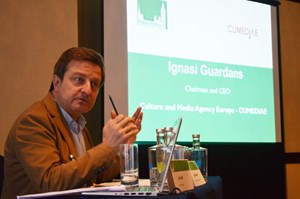
"The creative industries are special industries in that they exist between different worlds. Two worlds that need to communicate one with each other for any creative idea to be turned into a sustainable project: on the one side, the world of those with the passion of creativity; and on the other, the world of those with some knowledge about funding, management and the legal framework".
Image: CUMEDIAE Co-Founder and CEO Ignasi Guardians, image courtesy to CUMEDIAE
CUMEDIAE, Culture and Media Agency Europe aisbl, is a Brussels based international non-profit agency providing much needed consultancy for projects and initiatives that increase the impact of the creative industries across Europe and beyond. They are both a consultancy and a non-profit agency, helping creative practitioners to connect with people and organisations who can ensure that their work has impact and that they understand and can navigate funding channels, and other business aspects of the creative industries. CUMEDIAE also supports research and analysis projects which demonstrate the value and importance of the creative sectors.
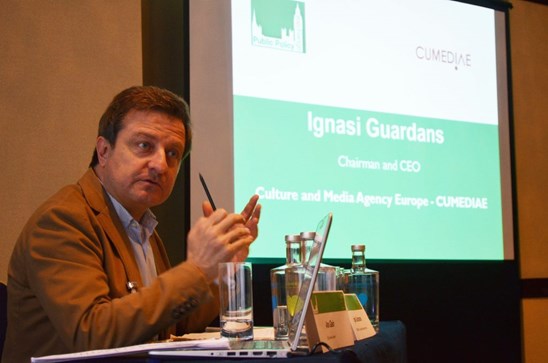
CUMEDIAE Co-Founder and CEO Ignasi Guardians, image courtesy to CUMEDIAE
CUMEDIAE was founded under the direct influence of the UNESCO 2005 Convention on Cultural diversity objectives and guiding principles. The structure was founded by a group of European professionals with long experience in the field of cultural management and cultural policy.
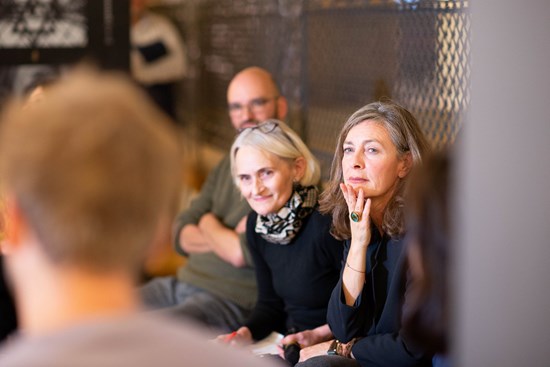
Image courtesy to CUMEDIAE
We spoke to the team behind CUMEDIAE to find out more about their work, their insight and their long term view in an industry that has been heavily impacted by recent global events.
ArtDependence (AD): Tell us a little about CUMEDIAE.
Ignasi Guardans, CEO and Co-Founder of CUMEDIAE:
The creative industries are special industries in that they exist between different worlds. Two worlds that need to communicate one with each other for any creative idea to be turned into a sustainable project: on the one side, the world of those with the passion of creativity; and on the other, the world of those with some knowledge about funding, management and the legal framework.
And we want to be in between. Bringing in the essential international dimension. Our team is not able to sort out all challenges that a cross-border creative project may find; but we can be at its side in that fascinating journey. They know they can find in us, and in our international team, the loyal adviser or even partner to make the journey much easier, and reach far beyond the more limited environment of a purely cultural organization.
Stefanie Thomas, Director of Strategy and Projects:
Since joining CUMEDIAE as head of strategy and projects in 2016, I have had the privilege of collaborating with many innovative organisations, and with amazingly creative individuals behind the work that they do. Among our activities, highlights include managing capacity development activities and sessions geared towards supporting various objectives, for example when supporting Women in Audiovisual in the Southern Mediterranean; the implementation of multiple communications campaigns, including for example, a large art installation in the center of the EU area of Brussels, proposed by an international foundation in coordination with the United Nations; and stakeholder engagement for multinational, multi-stakeholder, cross-border projects co-funded under various programmes of the European Union.
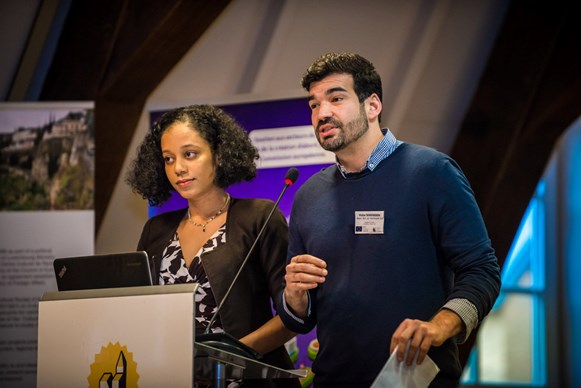
Image courtesy to CUMEDIAE
AD: Why do you believe that the creative industries are so important?
Stefanie Thomas: Just to stick to the economic facts, in 2010 the EU27 CCIs employed approximately 3.2 million people in almost 1 million organizations or companies, all over Europe. The total turnover, mostly of small and medium size organizations, amounted to €402billion, generating a total value added of €153 billion.
Consequently, it can be said that the CC Sector represents approximately 4.5% of the total business economy, and 2.2% of employees in the total European business economy (excluding financial and insurance activities).
We are now finding ourselves in the middle of the most difficult collective crisis the world has known in many decades. And within this complex environment of suffering, of fear, of personal and collective uncertainty, the cultural and creative sector is in a very special position. Culture and creativity in its multiple expressions are helping millions of people across the planet to go through each new day with the best mood. Works of culture are letting spirits evade confinement, are bringing joy to children and families, are helping us all in these bizarre times.
And yet, all of us know that the immediate economic and professional future looks cloudy for many of those creating, producing, performing, distributing culture and arts. Public support is more needed than ever before. But it will not suffice. Creativity will need to be applied to the cultural activity itself. The world after the tunnel will be different in many aspects, and the whole cultural sector will have an essential role to play in that transformation.
At CUMEDIAE aisbl we are contributing as much as we can and as we must. We are happy to be involved, precisely at this time, in a pan-European project dedicated to the analysis of cultural indicators and in support of its sustainability and social impact.
ArtDependence (AD): Can you tell us about Culture Agora and the impact it is having?
Stefanie Thomas: CUMEDIAE is proud to be in charge of a useful tool for the creative industries, our Culture Agora platform. We believe that more than ever, it can help in the cross-border sharing of initiatives, projects, and opportunities at this time. We are here to help.
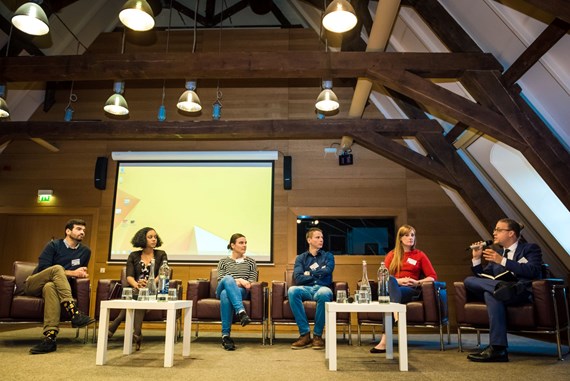
Image courtesy to CUMEDIAE
There are currently over 2000 organisations registered on Culture Agora. Our users are from Spain, Italy, the UK, Belgium, the Netherlands, Germany, Portugal, France, Bulgaria, Ireland, Austria, Greece, Slovenia, Poland and other countries. The platform is available in 7 different languages.
Given the huge quantity of organizations and companies that work on the CCI sector, the turnover and the value added that they generate, the sense of urgency to move towards internationalization of cultural activities and the low presence of cultural websites and platforms that promote the CCI sector and, more specifically, their services: Culture AGORA aims to fill this GAP.
Due to the Covid situation, many events and festivals have been canceled - and therefore our platform has had to adapt. We realised that digital and online content was growing, and we launched the campaign #CultureAtHome: every friday we share digital cultural content on our social media, providing relevant online events and museum visits, videos, training - all things that can be enjoyed from home.
AD: What projects are you working on at the moment and what can we expect to see from CUMEDIAE in coming months?
Stefanie Thomas: We are currently working on a few projects, including two larger scale projects: DISCE and Parallel Traces.
DISCE stands for Developing Inclusive and Sustainable Creative Economies and CUMEDIAE are responsible for the management of one of the work packages in the project. It is a three-year project bringing together researchers from Finland, Italy, Latvia and the UK. Funded by the European Commission, via the Horizon 2020 programme, this research will make a major contribution to understanding creative economies across the EU.
It combines ten regional case studies with EU-wide quantitative mapping, and draws on the team’s highly interdisciplinary expertise. It will investigate the relationships between higher education, skills development and creative work, emerging business models, possibilities for improved quantitative mapping, new ways to understand what the ‘growth’ of creative economies consists of, and why such growth is valuable.
At the heart of the project is the question of how the creative economies of the future can be both inclusive and sustainable. Addressing this question, the research will generate new empirical and conceptual insights of value to academics, policy makers and practitioners. Networks of creative practitioners and policy makers will play a vital role in this process, as the aim of DISCE, ultimately, is not only to understand the EU’s creative economies, but to help shape their future.
Recently, CUMEDIAE and Trans Europe Halles, partners of the DISCE Consortium, organised a 2 episode webinar series on the current and immediate state of creative economies in the context of the COVID-19 crisis. We will be exploring with CCI´s stakeholders how COVID-19 affects the creative economies in the EU and how we can thrive through it. The discussion brought together DISCE researchers, as well as representatives from Culture Action Europe (CAE) and IETM.
The Parallel Traces project, which interacts with content and heritage in an innovative, open and plural way, offers an essentially visual viewpoint on the attempt to unearth the traces of the Jewish cultural heritage in urban architecture and planning from the perspective of discovery by European citizens. The project is co-funded by the Creative Europe programme of the European Union.
The project discovers, rethinks and raises awareness about the European Jewish Heritage as an integral part of European history through different mechanisms: a call for artists, off-line and online communication activities addressed in particular but not only to the areas of influence of our local partners, and the development of a new app. CUMEDIAE provided one of the two Project Coordinators for Parallel Traces and is also in charge of several tasks around dissemination and communication for the project.
In response to Covid-19, Parallel Traces decided to postpone all scheduled exhibitions over coming months, so, along with our partners in the project, we decided to launch a social media and web campaign in cooperation with Jewish Heritage Europe, continuing to engage people who are interested in rediscovering and exploring Jewish heritage throughout Europe in an active and original way. We are asking people to share their own experiences about Jewish Heritage around Europe on social media. We are also asking people to think about the meaning of the site in the past, present and future.

ArtDependence Magazine is an international magazine covering all spheres of contemporary art, as well as modern and classical art.
ArtDependence features the latest art news, highlighting interviews with today’s most influential artists, galleries, curators, collectors, fair directors and individuals at the axis of the arts.
The magazine also covers series of articles and reviews on critical art events, new publications and other foremost happenings in the art world.
If you would like to submit events or editorial content to ArtDependence Magazine, please feel free to reach the magazine via the contact page.